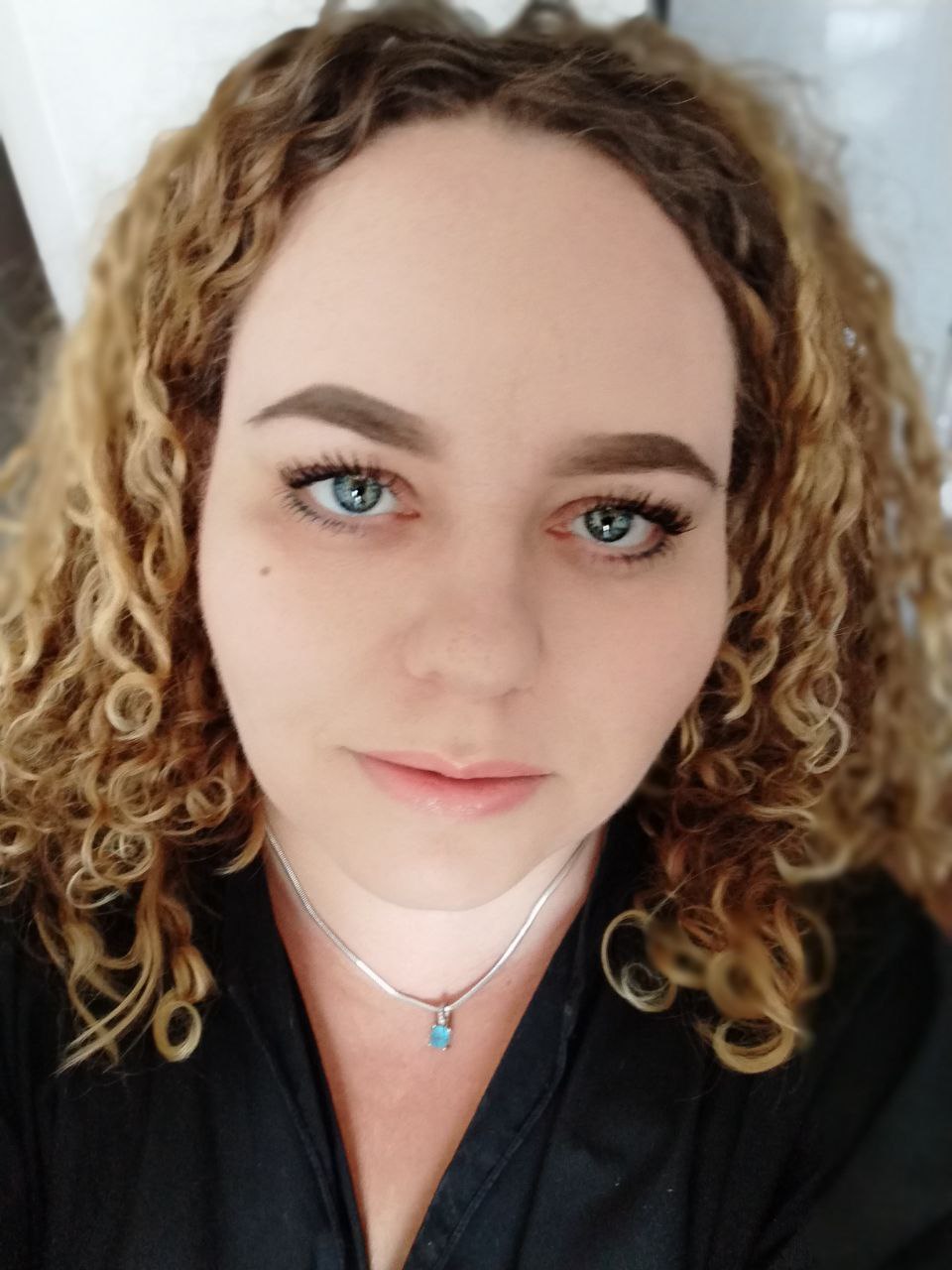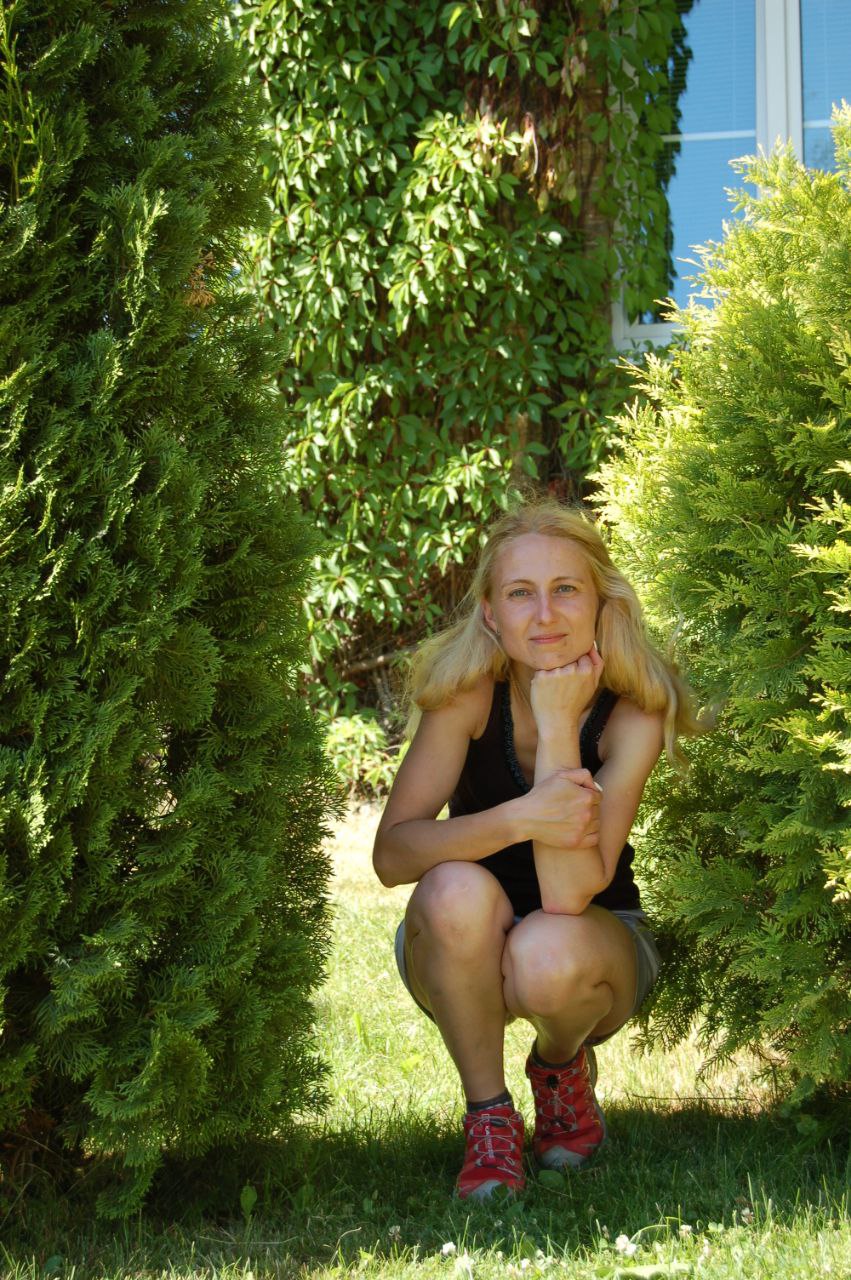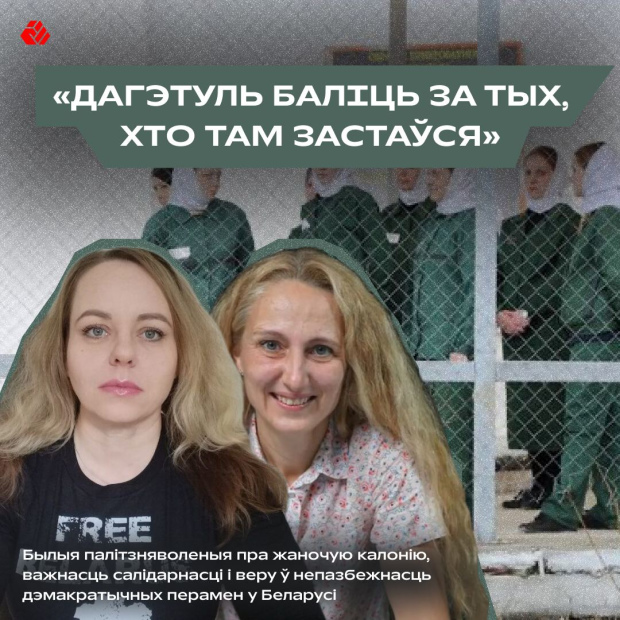Former political prisoners talk about the women's colony, the importance of solidarity and the belief in the inevitability of democratic changes in Belarus.
“They kill slowly, they enjoy torture”
“The first thing I noticed when I arrived at the Gomel colony was the call sign on the staff’s radios. They sounded like “Lubyanka-1”, “Lubyanka-2”, “Lubyanka-5”... A clear indicator that reveals their vision of the world,” says former political prisoner and journalist Olga Klaskovskaya.
The woman spent 26 months behind bars: during this time, she was convicted twice – in December 2020 under the most popular political criminal article 342, and later under the article “insulting an official.” By adding up the sentences, Olga received two and a half years in prison. She served her sentence in the Gomel women's colony and, having served it in full, left Belarus. Now the former political prisoner lives in Switzerland, where she received international protection.
“The second indicator, which very eloquently testifies to the morals in the colony and the moral character of its employees, is a large, almost entire wall, portrait of Felix Dzerzhinsky in the operational unit. All these things speak for themselves. The jailers, especially if we talk about the leadership of the colony, are zealous followers of Stalinist ideology. These are very cruel people, dedicated to repression, they sincerely consider political prisoners “enemies of the nation” and are confident that they are engaged in a noble cause, torturing, rotting and destroying us,” Olga Klaskovskaya shares her memories.
“The system is designed to dehumanize anyone who is imprisoned, no matter under what article. Women are prohibited from supporting each other, showing warmth and sympathy. You cannot share or exchange any sweets, cigarettes or hygiene products. The head of one of the detachments told us that we do not even have the right to take a pencil from another convict to write something and return it, because there is a punishment for this,” says former political prisoner Natalia (heroine's name has been changed for security reasons). A woman was sentenced to three years in prison in 2021 under the same notorious “national article” 342 – “organization or active participation in group actions which grossly violate public order." She served her sentence in the Gomel women's colony: while behind bars she contracted coronavirus and acquired several chronic diseases.
After her release in May 2023, the former political prisoner left Belarus. Now she lives in Poland.
“The memories of imprisonment are very difficult,” Natalia continues. “Sometimes I want to forget about all this, but I can’t. When I see that it is ten in the morning or eight in the evening, every time I understand that at that moment our friends are standing for a shameful checking, and that this happens in any weather. When we sewed yellow tags onto our clothes, it evoked certain parallels in our heads. Even though the colony staff seem to adhere to the internal rules, political prisoners are increasingly losing strength and health – physical and mental – every day, and at the same time they cannot protect themselves in any way. Also, the political prisoner is constantly threatened with a new term.”
Olga Klaskovskaya says that the regime kills political prisoners slowly. And when jailers torture, they get great pleasure from it, and at the same time they also position themselves as humanists and moralists:
“In the detachment where I was sitting, there were four toilets for a hundred people. In the morning it was impossible to get to the toilet at all. Monstrous conditions have been created for women in the Gomel colony: they cannot properly wash themselves or clean themselves up. During forced labor in the factory, you can’t breathe, in the summer the temperature in the workshop is more than forty degrees, women often lost consciousness because of this. You are constantly sent to heavy inventory work, forced to shovel snow and puddles, clean the asphalt from bird droppings. You are there all the time hungry, dirty, sick, exhausted, and there is practically no medical care.”
“I spent almost five months in a punishment cell and PKT (cell-type premises – ed.), and sometimes I thought that it would be better if they had already shot me than to go through all this hell every day,” Olga Klaskovskaya shares her memories.
Ex-political prisoner Olga Filatchenkova, sentenced in 2021 to two and a half years in prison under the “national article,” adds that the most difficult thing in a colony is that you don’t belong to yourself, and anything can happen at any moment.
“In the colony, everything is organized in an extremely stupid way: prison clothes have pockets, but you can’t keep your hands in them. There are radiators, but you cannot dry clothes on them. There are lockers and bedside tables, but you can't store almost anything in them. It seems like you have clothes, but if it’s cold or hot, you can’t even change them at will, because you must be dressed according to the uniform number established at that time. In the end, there are showers in every detachment, but you can’t wash yourself. Well, and a lot of other things, like dragging snow in bags behind the canteen or shoveling puddles after rain,” recalls the former political prisoner, who left Belarus after her release and now lives in Poland with her children.
“Without support and solidarity, we might not have survived there”
Olga Filatchenkova is sure that solidarity played a big role in surviving imprisonment:
“Support and faith in people really helped me to hold on. I also believed that everything would eventually be fine, I tried to remain optimistic, smile even through force, and not lose heart. I am very grateful to all Belarusians for their care, empathy, for always finding warm words of support for us and writing to us. Thanks to you, we survived this hell.”
Natalia adds that jailers always strive to make a political prisoner lose a self-control and break down. Therefore, the interlocutor notes, hostages of the regime are constantly getting it into their heads that no one needs them, and everyone has forgotten about them.
“We have always believed that this is not true, that this is a lie and manipulation by people in uniform. The fact that we were almost completely deprived of correspondence, our letters were stolen and destroyed, access to information was limited, and during telephone calls home our every word was censored does not mean that the Belarusians forgot about us and renounced us,” says the interlocutor. “We still received information from outside, although in very limited quantities, we still got it, in different ways. We knew that people continued to fight for us, that we had symbolic godparents in Western governments, that Belarusians abroad and European human rights activists were constantly holding actions in our support. Thanks to this, we got a second wind.”
“Solidarity irritated the jailers very much: in every sign of it they saw danger and sedition. Once the operatives destroyed my postcard because I wrote there “good will triumph over evil,” recalls Olga Klaskovskaya. “The head of the operational unit Alekhin considered this harmless phrase “conspiracy slogans of the opposition.” Isn't it insanity?”
“Any attemps of solidarity were suppressed: both between political prisoners and external ones. But we still knew that the Belarusian and international community remembers us and is constantly fighting for our liberation. We knew that for Svetlana Tikhanovskaya the topic of releasing political prisoners is the number one problem, and that she constantly raises it in the international arena, constantly appealing to Western politicians on this issue. I don’t know how I would have survived that hell without solidarity. I am truly grateful to everyone for their support. Thank you for not forgetting about us and always trying to get us out of captivity and make our life behind bars at least a little easier.”
"All sacrifices are not in vain"
“I don’t regret anything,” says Natalia.” When I made my choice and registered as an independent observer in 2020, I did it consciously. My parents raised me on the principles that truth comes first. And I just wanted to know the truth about the results of the presidential election. We went through difficult experience, but we, thank God, survived and did not lose our humanity. And we became even more convinced that our country needs to be returned to the mainstream of law and order.”
Olga Filatchenkova adds that imprisonment became a “real school of life” for her and that she also does not regret anything:
“I have become stronger and wiser. I met a lot of wonderful people behind bars. Yes, our experience is difficult and dramatic, but I am proud that we were and remain on the right side of history.”
“Of course, it would be better if this prison does not come into my life, as well as all these monstrous repressions that have swept Belarus since the twentieth year did not come into our lives. But if we had not taken to the streets then, in the 2020, and defended our choice, if we had not been together with our people, then we would not have been us,” adds Olga Klaskovskaya. “Of course, I don’t regret anything. It’s not all in vain, just like all sacrifices are not in vain. They all form the foundation of the new Belarus.”
“And Belarus will someday be free and democratic. Nothing is over yet; the page has not been turned. Belarusians are a freedom-loving European nation, which has long outgrown this regime and knows what it means to be called “nation”. And in the end, we will defend this right.”


 Continue
Continue
